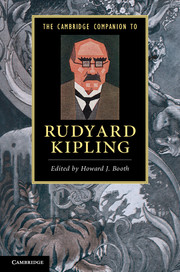Book contents
- Frontmatter
- Introduction
- 1 Kipling and the fin-de-siécle
- 2 India and empire
- 3 Kipling’s very special relationship: Kipling in America, America in Kipling
- 4 Science and technology
- 5 Kipling and gender
- 6 Kipling and war
- 7 Kipling as a children's writer and the Jungle Books
- 8 'Nine and sixty ways’: Kipling, ventriloquist poet
- 9 Kim
- 10 The later short fiction
- 11 Kipling and postcolonial literature
- 12 Kipling and the visual: illustrations and adaptations
- 13 Reading Kipling in India
- Further reading
- Index
5 - Kipling and gender
Published online by Cambridge University Press: 28 September 2011
- Frontmatter
- Introduction
- 1 Kipling and the fin-de-siécle
- 2 India and empire
- 3 Kipling’s very special relationship: Kipling in America, America in Kipling
- 4 Science and technology
- 5 Kipling and gender
- 6 Kipling and war
- 7 Kipling as a children's writer and the Jungle Books
- 8 'Nine and sixty ways’: Kipling, ventriloquist poet
- 9 Kim
- 10 The later short fiction
- 11 Kipling and postcolonial literature
- 12 Kipling and the visual: illustrations and adaptations
- 13 Reading Kipling in India
- Further reading
- Index
Summary
'Unfortunately, everybody must be either a man or a woman' according to Dick Heldar, the hero of The Light That Failed (1891), who goes on to tell Maisie, his childhood sweetheart, that she is not a woman. Maisie, now a young artist, craves the professional recognition reserved only for men, and, to Dick's horror, chooses a same-sex companionship over marriage, which she senses would compromise her independence. In many ways, Maisie embodies the fin-de-siécle figure of 'the New Woman' , which gave expression to feminist ideals and aspirations, but also to society's fears and anxiety about the budding women's movement and its threat to conventional values. There is a strong sense in Kipling's world that men and women live in separate spheres and should abide by different laws, and that women, as J. M. S. Tompkins argued, 'should not attempt to play a man's part in a man's world'. This makes Maisie, who seeks to be liberated from her traditional gender roles, problematic for Dick, who wants to marry her, and for Kipling, who wishes to put her back in her place; for both, she is neither a man nor a woman.
- Type
- Chapter
- Information
- The Cambridge Companion to Rudyard Kipling , pp. 66 - 79Publisher: Cambridge University PressPrint publication year: 2011
- 2
- Cited by

